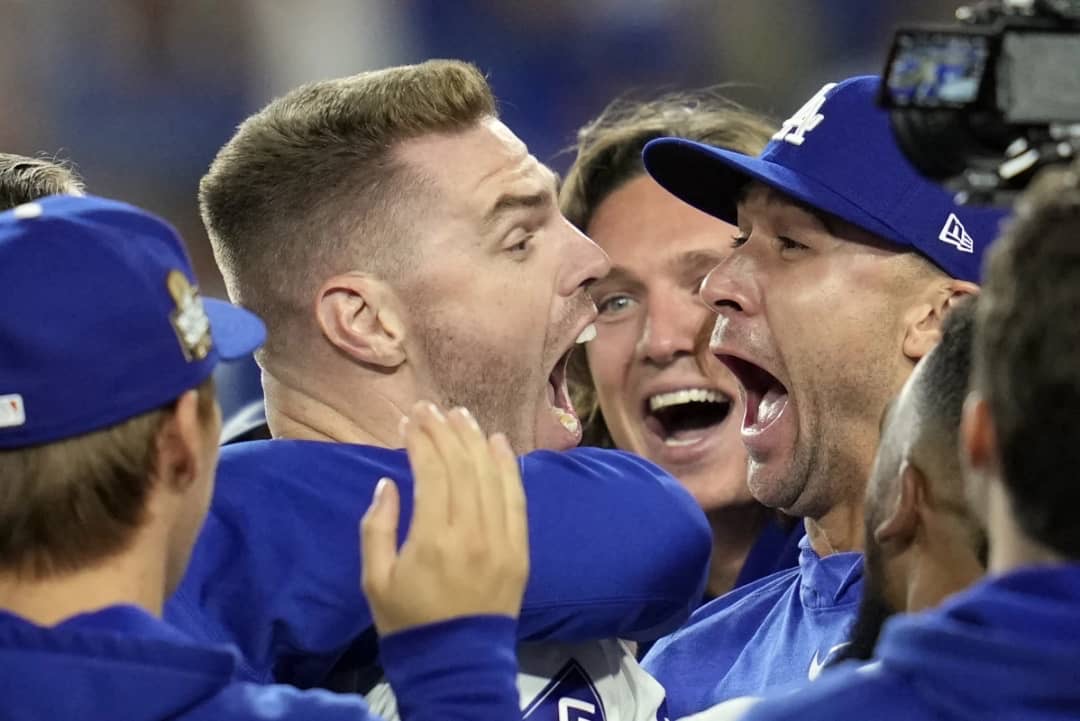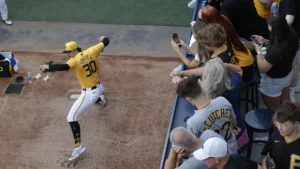
Freeman’s Historic Walk-Off Slam: Dodgers’ Victory or Bad Officiating?
The 2024 World Series opener between the Los Angeles Dodgers and the New York Yankees was nothing short of a classic, with Freddie Freeman’s walk-off grand slam sealing a thrilling 6-3 victory for the Dodgers. It was a moment that will be remembered for years to come, as Freeman became the first player in World Series history to hit a walk-off grand slam. Yet, while Dodger fans celebrated a legendary moment, others are raising eyebrows over the controversial calls that set up this historic play. Could this dramatic finish have been influenced by questionable officiating?
The Play That Changed Everything
The Dodgers and Yankees battled fiercely, tied 3-3 heading into the bottom of the ninth inning. With the bases loaded and two outs, Freeman stepped up to the plate against Yankees closer, Clay Holmes. On a 2-2 count, Freeman unleashed a towering shot over the right-field fence, electrifying the Dodger Stadium crowd and securing a 6-3 win. But what many are questioning is how the Dodgers managed to load the bases in the first place.
Was the lead-up to Freeman’s iconic slam marred by bad officiating?
The Controversial Calls That Paved the Way
Critics and Yankee fans alike are pointing to a few key moments in the ninth inning that may have tilted the game in the Dodgers’ favor. The most contentious was a ball-four call to Dodgers’ slugger Mookie Betts, who was awarded a walk that loaded the bases. Replays showed that the pitch could have been called a strike, and Yankees manager Aaron Boone certainly thought so, as he stormed out of the dugout to argue with the umpire. It wasn’t the only questionable call; earlier in the inning, a borderline strike on Max Muncy was also called a ball, allowing him to get on base. These close calls seemed to go the Dodgers’ way at critical moments, leading to growing speculation about the quality of officiating.
Were these just unfortunate breaks for the Yankees, or is there a deeper issue at play?
The Human Element of Officiating
Baseball purists often argue that the human element of officiating adds to the drama and unpredictability of the game. But when a game of this magnitude hinges on a few disputed calls, questions about fairness inevitably arise. It’s no secret that umpires have been under increased scrutiny in recent years, especially with the advent of technology like the automated strike zone (or “robo umps”) being tested in the minor leagues. This game’s dramatic finish is now at the center of a debate over whether baseball should adopt technology to eliminate the possibility of human error, especially in crucial playoff moments.
If those calls had been made differently, would Freeman have even had the chance to make history?
The Yankees’ Perspective
Yankees fans are understandably frustrated, feeling that the umpiring inconsistencies cost them a chance to steal Game 1 on the road. Social media was ablaze with debates over the strike zone, with some fans accusing the umpires of favoring the Dodgers. For the Yankees, who entered the game as slight underdogs, losing in such a manner stings even more. After the game, Boone was careful with his words but hinted at his displeasure, stating, “I thought there were a few calls that could have gone our way, but that’s baseball.”
Yet, while Yankees fans lament the officiating, Dodgers supporters are quick to point out that missed calls are part of the game and that their team capitalized on the opportunities presented to them.
Is it fair to suggest that the Dodgers’ victory was illegitimate because of a few controversial calls?
The Need for Change?
The drama of this game only fuels the ongoing debate about the need for more technological intervention in baseball. Automated strike zones could have potentially avoided the controversial ball-four call to Betts, possibly changing the outcome of the inning. Those in favor of robo umps argue that the technology would make games fairer, ensuring that no team benefits from an umpire’s misjudgment.
Opponents, however, fear that over-reliance on technology could strip the game of its traditional charm. Baseball, after all, has thrived on its unpredictability and the heated debates over what was and wasn’t a strike. Yet, when the stakes are as high as a World Series opener, the balance between tradition and accuracy becomes even more delicate.
Conclusion: A Historic Win, but at What Cost?
There’s no denying that Freeman’s walk-off grand slam will go down as one of the most iconic moments in World Series history. But it’s a moment that will be forever shadowed by questions of bad officiating. Did the umpires inadvertently hand the Dodgers a win, or did Los Angeles simply seize the moment? For now, Freeman and the Dodgers lead the series 1-0, and baseball fans around the world are left debating whether the game was won fair and square or if the Yankees were robbed of a fair fight.
Should Major League Baseball address the issue of officiating standards, or is this just part of the game’s inherent drama? The debate is far from over, and as the series progresses, all eyes will be on how the umpires handle the high-stakes matchups to come.






